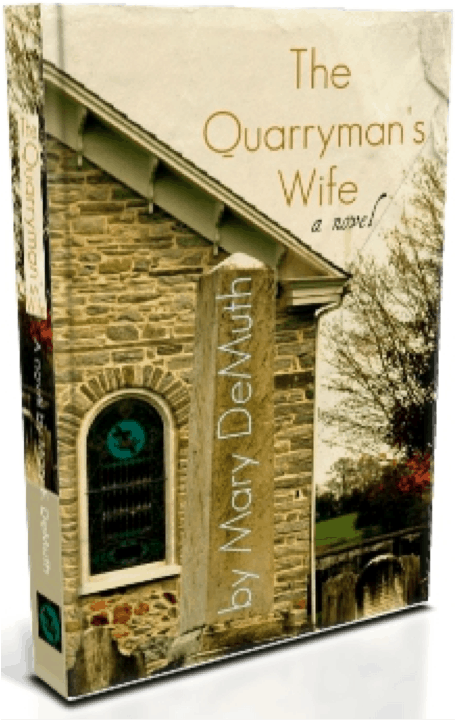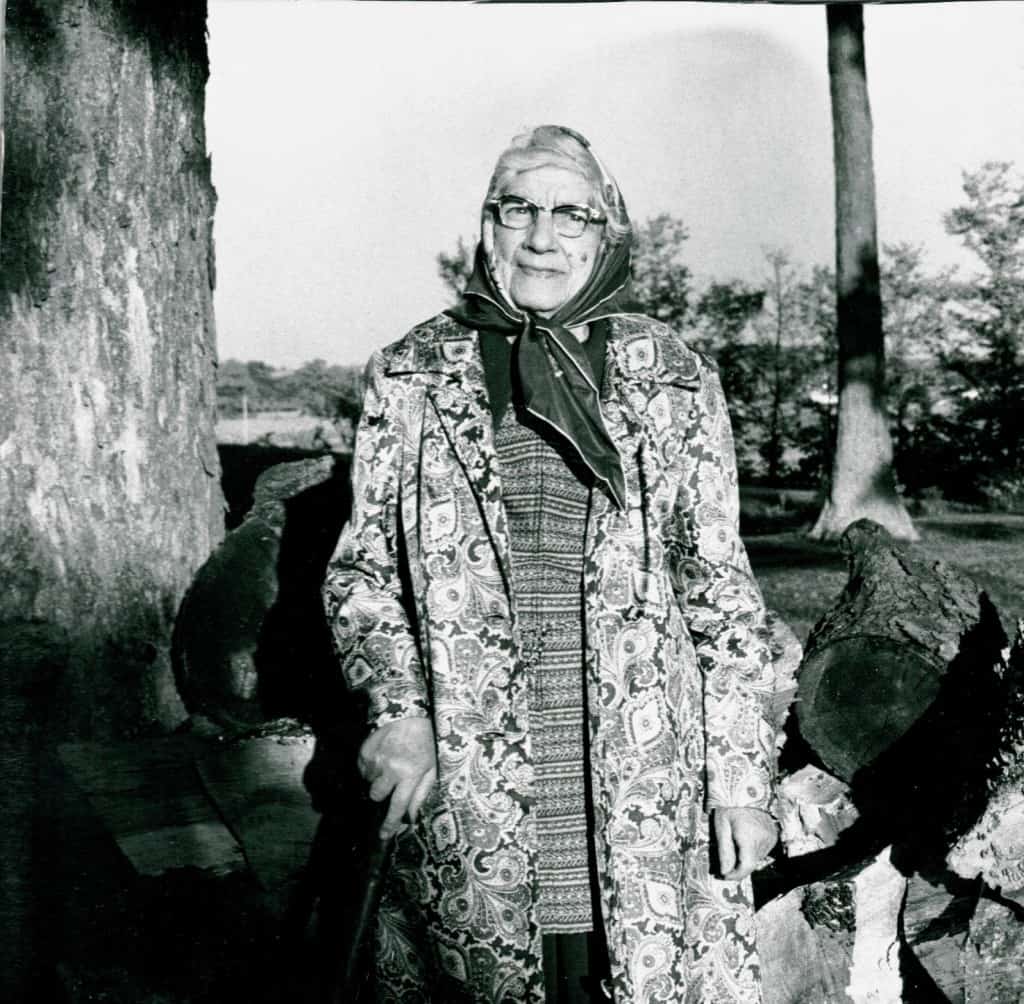
The story behind The Quarryman’s Wife
I wrote this book to honor my great grandmother, Mary Walker, who lived like Jesus, told her stories fearlessly, wrote poems for everyone, and loved her children even after devastating loss. Her pluck and candor fueled my desire to write this book as a testament to her life.
During the Great Depression, she lost her husband in a devastating accident and had to raise her children without him and without reliable income. She took in sewing and did everything she could to feed her children. I knew her many years. We talked. She held my hand and prayed for me. And when she died at 103, I could physically feel the loss of her prayers. I still miss her. Want to meet her? Here she is:
The Quarryman’s Wife is the first novel I ever penned, so it’s dear to me. When I submitted it back in 2004, editors said they didn’t want Depression-era fiction. So I put this book on a shelf, always wanting to see it in print, never forgetting the story, hoping someday others would enjoy it. Now that it’s in print, I hope The Quarryman’s Wife touches your resolve, energizes you to love others more fiercely, and helps you to persevere through your own economic stress, grief, or changing family dynamics.
The Quarryman’s Wife also signifies the first time I wrote historical fiction—and most likely, it will be my last. I’m not a digger. I don’t flourish in details. But in researching this book for several years, I learned so much. Culled from my great grandmother’s visits, video interviews of relatives, and her writings, I found her struggles universal, and her story heartening.
This book is my first foray into novel writing. May the story transport you to a simpler time where hard work, grit, and filial love guided folks toward quiet greatness.
Stay tuned for a physical paperback in early 2012!
Click here to read it on your Kindle or Kindle app.
Read the first three chapters:
Chapter One
Centerville, Ohio. March 14, 1932.
Augusta always knew Thomas would die young. Always knew God would thrust his angry finger through the muggy Ohio air and point right at him. “Your time’s up,” the Almighty would say. And Thomas, being obedient to the depths, would nod quietly, then slip into glory without so much as saying goodbye.
The word accident repeated itself with each slap of Augusta’s shoes against shale. Accident. Accident. The word screamed in her head, longing to release, but clenched teeth kept her terror to herself. She needed Thomas. Needed his gentle hand with six children and a quarry house to run. Needed his grace-like words. His humor.
Her friend Olya followed behind as they passed stilled shovels, empty water pumps and halted rail cars standing sentry-like in reverential silence. The quarry’s Dinky engines saluted the two wives as they raced toward the rock quarry’s belly.
Thomas, you promised me there’d be no accidents.
Chapter Two
An odd chill twisted inside Meg. She told her stomach to settle. It didn’t obey.
Heading away from school toward Mama’s list of chores, she watched Lily lead the processional of children in pied piper fashion toward the quarry house. At eighteen, Lily’s hair flowed down the back of her dress and frock, blessedly straight. Facing womanhood at fifteen, Meg pined for that straight honey-lit hair, but she tried not to let on that she did. “It’s the sin of covetousness,” Mama scolded when Meg revealed her longing for Lily’s hair.
Lily turned toward her. “Remember me today. I’m afraid I’m a bit weary to be chasing the Wheeler twins around. Are you sure you can’t come help? I’ll pay you.”
“I still have some reporting to do. Miss Allen’s been nagging me about the story I’m working on. I’m sorry. Can’t I help you next week?”
“You’ve procrastinated that story for months. Come just this once?”
“I have the rest of the children to herd home. You know that.”
With that, Lily said her goodbyes to Edward, John-John, Helen.
Lily nodded. Her eyes showed disappointment, but true to form, she thanked Meg for considering it and detoured onto East Franklin Street where two squirrelly Wheeler children awaited her calming touch.
Meg envied Lily, as she walked—no, glided—toward work. Meg never glided, she plodded. John-John once said she clip-clopped like Strawberry, their faithful horse. Her feet grew like rushes, rapid and serpentine-like, so that the only shoes that fit her now were eldest brother’s Frank’s—cloddy, awkward. But with Frank wheezing at home, straining to bring in breath, she knew she should simply be thankful for her own. She pulled one in just for him.
She shrugged, hoping the shrug would shush the antagonistic voices in her head. Someday, she would be elegant. She looked forward to her walk from school in the lazy afternoons when springtime welcomed new bird songs. Mother Nature had flung herself in all her icy fury on Centerville last winter. Meg tasted the cold from September’s first frost until the March blizzard. Until Frank took to the fever, Frank and Edward spent snowy days tamping down paths with their big snow boots for the schoolchildren to walk through. Sometimes a drift would swallow up a quarry kid, so the big boys took to carrying the wide-eyed first graders up the steps to school. It was a relief to have winter’s frigid breath behind her.
Unlike the biting winds of Ohio winter or its muggy days of summer, the spring air had a delicious crispness to it. Faint whiffs of emerging forget-me-nots trailing along a broken fence lightened Meg’s stride as she walked the western shore of the quarry lake.
And still, that niggling.
She renamed the lake “Lake Frank” after her eldest brother’s fake drowning. John-John, who was mischievously eight at the time, thought it would be great fun to yell, “Frank drowned!”
Panicked, Mama had called Decker’s store; she had them dispatch their boat, complete with grappling hooks. Swimmers dove in deep, scanning for Frank in vain. Mama and Meg stood on the back porch, waiting. On the lake perched a small island connected by a rock-strewn isthmus, so several of the men looked for Frank there, hoping he was playing some puckish hiding trick. The search stretched to an hour while Mama rung her hands in helpless anguish. She didn’t even notice Frank when he stood next to her, puzzled.
“What’s all the excitement? Why are all these people swimming in our lake?” Meg could still remember the look on Mama’s face, a combination of relief and anger.
“We thought you drowned! What do you have to say for yourself?”
He shrugged. “You knew I was helping Louis Hanson clean out the fence row at the back of his farm. Did you forget?” Mama had forgotten, and that day the nondescript quarry lake became Lake Frank to Meg. Frank celebrated its christening with the spanking of his life.
She couldn’t help but think what would happen if Frank met his maker that day, and as she plodded home, the familiar tinge that something wasn’t right pitched a tent inside her. The world seemed too quiet. The path in front of her, too neat.
Chapter Three
Augusta stopped.
Before her stood a pile of boulders not there yesterday. Men, like ants serving their queen, scurried about the heap, yelling. The acrid smell of heated rocks permeated the air like the fire-smoke she created in childhood by pounding rocks together. The odor anchored Augusta’s feet to the earth.
“Gloves?” Few understood English, so she pointed to her hands. A dirtied face shook his head no.
Augusta hefted a long plank and motioned Olya to grab the other end. “Leverage with this. Help me get it under.” Her Ukrainian friend obliged. Together they pried at the unforgiving rock until it moved, slightly. Augusta scampered over while an errant wind flapped the skirt of her dress. She sat on the pile above and pushed the moving rock with her legs, careful to smooth her skirt first.
Other wives stood watching, hands held to their mouths like speak-no-evil monkeys. But Augusta bled and dug, grunting under the weight of grief, fear, immovable boulders.
“Stop!” Ira Strang’s voice cut through the labored voices. “I hear something. Quiet!” Even Hattie Wheeler, prone to theatrics, stopped to listen.
Nothing.
A minute passed.
Through the rubble, a muffled noise escaped. “Help” was all it said, but its utterance spurred immediate energy in the quarry. Silence became hollering; inaction sprung to frenetic action. Augusta returned to digging as bits of shale tore into the flesh of her ungloved hands.
“We got one, Doc.”
Augusta’s stomach shot her breakfast to her throat. She swallowed the sting.
Doc Fenn, black bag in hand, rushed over.
“It’s Crawford,” yelled Elijah Frye, the quarry’s electrical engineer. Augusta pulled away from digging and hurried over. Benjamin Crawfords’s bluish face nearly blended with the quarry, the rest of him still buried. The doctor bent over Mr. Crawford, placed a finger on his jugular. The doctor’s shoulders slumped, his head dropped.
“He’s dead,” he whispered. Cries perforated the silence.
When dusk shrouded the rescue, floodlights hooked to electric generators cast a ghastly glow on the pile. Over and over the discoveries had the same conclusion. Someone would yell I’ve found one. Everyone would stop. Doc Fenn would press his finger into the man’s neck, whisper he’s dead and the digging would continue.
Benjamin Crawford.
Jack Ramsey.
Jim Wheeler.
Hattie Wheeler collapsed when Doc Fenn announced Jim’s demise, though Augusta worried more for Welcome, Jim’s sweet-tempered brother.
When another I’ve found one echoed off the quarry’s walls, Augusta’s bleeding hand grabbed Olya’s.
“It’s the immigrant. He’s alive!” Alex’s eyes were closed, but his lips moved. His upper torso now lay exposed, his lower trunk held captive by one menacing boulder. Men above strained against an iron lever to free him.
“What’s he saying?” Doc Fenn looked at Olya.
“He says he can’t feel his legs” She pulled the babushka from her head and held it to Alex’s bleeding temple while men strained to free him. The rock budged, then gained momentum and rolled off Alex’s legs.
“Let’s get him to the hospital,” Doc Fenn ordered. “Easy now. Lift him easy.” Augusta noticed how Alex’s ankles skewed outward, like a child’s first drawing of legs and feet. Olya kept her hand on the side of his face. She sang to him.
She looked up at Augusta. “Don’t worry Miss. They’ll find your Thomas.”


0 Comments